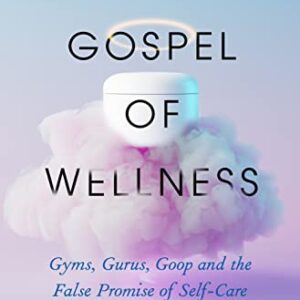The Gospel of Wellness
One of the most provocative presentations at the recent Mockingbird Conference I attended in NYC came from the journalist, Rina Raphael. She drew on her new book, The Gospel of Wellness: Gyms, Gurus, Goop and the False Promise of Self-Care.
 Raphael has herself been a wellness devotee, finding value in the experience. But as a journalist and consumer she began to develop some questions about what might be the called “the dark side” of a huge and growing — five trillion dollar a year business — in the U.S.
Raphael has herself been a wellness devotee, finding value in the experience. But as a journalist and consumer she began to develop some questions about what might be the called “the dark side” of a huge and growing — five trillion dollar a year business — in the U.S.
The wellness industry promises people, women in particular, solutions to their every problem. If you buy enough stuff, get the right supplements, sign up for enough programs and drive yourself in the pursuit of optimal health and wellness, you’ll be back in life’s driver’s seat!
But is it working? Maybe not. For at least some of those pursuing wellness, “the cure,” observes Raphael, “can become worse than the disease.” Wellness can suck up a tremendous amount of money, time and energy. For some it doesn’t bring greater peace of mind, only more stress; not improved health, but the predictable side effects when something that becomes an obsession.
According to Raphael, what’s driving the current obsession with wellness and the industry to which it has given rise, is that wellness promises to help people deal with the feeling of being overwhelmed, of life being out-of-control as well as the common experiences of exhaustion and even loneliness. “It [Wellness] promises women the one thing they most desire: control.” Feeling low on energy . . . try this supplement. Are you totally stressed? Our wellness program will change your life . . . even give you back your life! Do you wish you had a community of support? Join our gym and your own personal trainer will be your guide, guru and confessor.
If some of this sounds like it is filling needs that religion once met, you’re right. Raphael is an orthodox Jew who is especially good on all the ways that wellness has become a new religion. In some cases, e.g. Pelleton and Soul Cycle, the draft on religion has been quite overt and intentional. Wellness promises a this-worldly salvation, a new you. It offers belonging, being part of a group, one that has its own language, rituals, clothes and gear. And it offers respectability. “I’m really into wellness . . . I’m working on myself!” Like most religions, wellness promises that if only you try hard enough you’ll be able to save yourself.
At Mockingbird where the crowd is religious types, salvation by works is anathema. This whole Mockingbird project is about grace, what some call “God’s one-way love.” It is a love and mercy that comes to us even, or especially, when we are unloveable or underserving (overweight even!). “It’s not all about you, not all on you,” the presenters at Mockingbird said one after another and in a lot of different and entertaining ways. So Rina Raphael was at home shining a light on the latest religion of works-righteousness and self-salvation.
She noted two particularly problematic aspects of the Gospel of Wellness.
It is highly individualistic. It’s one more time when people, again women especially, are told “It’s all on you.” Instead of looking at the systemic issues in our culture, the wellness industry offers individual solutions (for those who can afford them). But in doing so, argued Raphael, it can end up “silencing” women and masking deeper issues. She cites the woman who, having trouble with a toxic work environment, went to HR where they told her, “try meditation.” Spirituality/ mindfulness techniques and their new emphasis in the workplace, may become only another way for employers to smile as they push for higher productivity and ignore real issues.
The Wellness industry, it’s influencers and gurus, preach self-love, self-compassion and self-improvement. But seldom, notes Raphael, do you hear any mention of charity or service to others. Nor does the wellness “community” continue if you can’t pay the monthly fee!
She wonders if the individualistic emphasis of the wellness industry is actually compounding 0ur problems. The problem of loss of community, absence of shared life and common rituals for facing life’s ordinary crises. Her questions were stirred when her father died. As a Jew, she and her family sat shiva and were surrounded by a community and tradition that were both deeply rooted and deeply healing. An on-line workout wasn’t a sufficient substitute in Raphael’s hour of need.
Not only is the industry focused on the individual, it is also “hyper-consumerist.” Buy this crystal, consult that astrologist or Tarot reader, get that vitamin pack, drink this pro-biotic juice or de-tox with this tea, buy these clothes and this equipment. Instead of asking what’s wrong in a culture that is making so many feel over-stressed and over-burdened, “we’re told we can shop ourselves out of it.”
Being reasonably fit, eating well and exercising are good. I hit the Ballard Health Club most days. And Linda keeps working to shape our mostly vegetarian diet. But from Raphael’s point of view the wellness industry has itself gotten out of control. While promising to give people greater control, it may only be adding to the frantic and isolated nature of life in 21st century America.
![Anthony B. Robinson [logo]](https://www.anthonybrobinson.com/wp-content/themes/anthonybrobinson/images/logo.png)
![Anthony B. Robinson [logo]](https://www.anthonybrobinson.com/wp-content/themes/anthonybrobinson/images/logo-print.png)